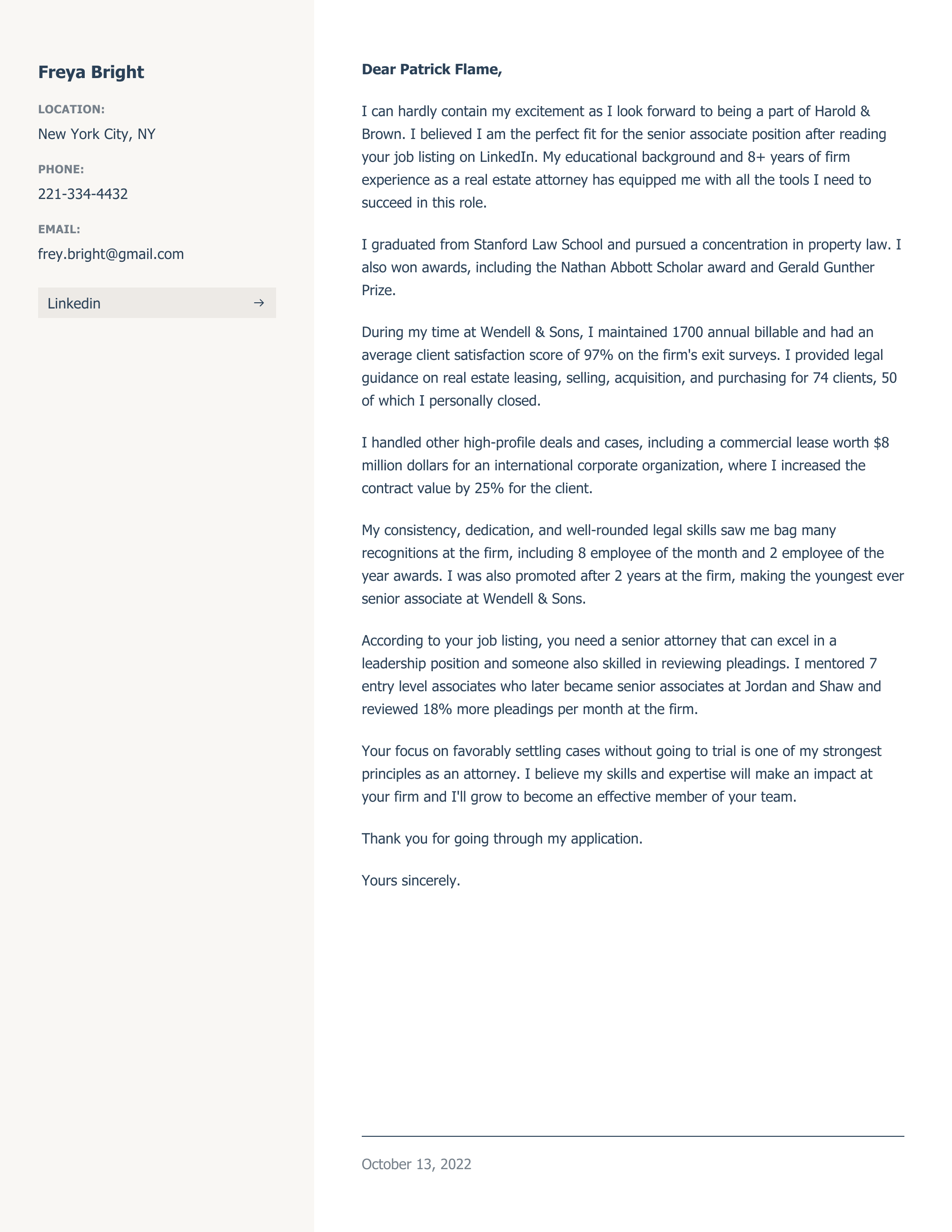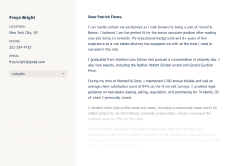There's no easy way to say it: preparing a successful lawyer application is difficult.
While last year's job numbers for lawyers
were pretty good, landing jobs in private practice is still a tough competition.
You need to put together a stellar application, and your
cover letter
plays a critical role.
Whether you're an experienced attorney or a fresh graduate looking for your first job, a compelling cover
letter can get the recruiter's attention and get you hired.
Why? That's because hiring managers often read attorney cover letters before going through resumes. So,
it tells the manager if they should bother reading your resume.
In other cases though, your resume has to interest them enough to get them to read your cover letter.
That's why
writing a great attorney resume remains critical.
In that case, it's the cover letter's job to lock down that interview.
This article will show you why and how to write an interview-winning cover letter whether you're an
experienced legal professional or fresh graduate.
We'll also include some practical examples to show you how to execute each part of the letter.
Why do You Need A Cover Letter
It's okay to ask, "Do I have to write a
cover letter?"
Honestly, many of us have been there.
That's because during some job-hunting processes, we've come across recruiters that say cover letters are
less important than resumes. Some even go as far as saying they don't want a cover letter at all.
So do you need one? The short answer is yes. Why? Here's the long version:
- Most job listings require you to use a cover letter. Even when it's not clearly stated or tagged
"optional," the recruiter will see that you've put in extra effort, which makes you serious about
the job.
- Hiring managers may be too time-constrained to read every cover letter. After all, they may be going
through hundreds of applications. That said, they may need to read a cover letter if they're not
quite convinced about a candidate or need additional info.
- The cover letter introduces you to the recruiter and shows them your personality.
- The letter gives the recruiter an opportunity to evaluate your writing skills and attention to
details.
- The cover letter allows you to express your passion and enthusiasm for the job in ways the resume
can't.
So, unless the job ad explicitly prohibits you from submitting a cover letter, you should absolutely
prepare one, even if it's optional.
The Importance of Submitting a Great Cover Letter
We've established why you
should submit a cover letter, but it's critical to emphasize on submitting a great cover letter.
What's a great cover letter? It's a customized letter specifically prepared for the job you're applying
to. It's well-written, straight to the point, and lacks errors.
You should avoid the mistake of using material you created using a generic lawyer cover letter template.
Because if there's anything worse than not attaching your cover letter to your application, it's
submitting a bad one.
Principles to Follow When Writing a Cover Letter
Your writing, attention to
detail, and proofreading skills are critical legal skills that shine through your cover letter. So it's
important that you write the letter professionally to make it serve as a practical indication for your
written work product.
Keep it at the back of your mind that the execution of the cover letter, from your salutation to your
format and conciseness, will form the basis of your assessment.
Apart from that, you must include information and elaborate on your skills and experience in a way that
will win the recruiter over.
Here are principles that you should follow when writing your lawyer cover letter:
Be Concise
Hiring managers don't have all the time in the world. They often have hundreds of applications to
evaluate. So, respect their time by going straight to the point and using as few words as possible.
Your mission is to pass the right message across and not to impress them with your vocabulary. Ensure you
elaborate on skills that are relevant to the job and talk about achievements that show you'll excel at
the role.
Using a long cover letter only shows the hiring manager your inability to achieve fast and efficient
results.
The cover letter should ideally be one page and 250 to 400 words long.
Prioritize the Employer
While your main goal is to convince the manager you're right for the role, make sure you don't include so
much of your personal stories. Look at the job description and focus on what you believe the recruiter
wants to know.
Customize Your Cover Letter for the Job
From your skills and achievements to your experience, you must add only things that will show how you'll
perform in the role. Use keywords in the job listing to guide your stories and the list of your
accomplishments.
For example, the recruiter may be looking for a senior attorney that can maintain a high rate of billable
hours. In that case, you can tell them your average billable hours in your previous firm, then show them
your client satisfaction rate or your efficiency. This way, you're telling them high billable hours is
your thing and you can do it effectively.
In the same vein, avoid adding unnecessary things since you're working with one page and a limited number
of words.
Many attorneys and fresh law graduates make the mistake of creating a one-size-fits-all document.
Whenever you use a customized letter that includes the name of the recruiter and company, it shows you
did your research and displays your willingness to go above and beyond for the role.
Follow Instructions
It's important that you follow specific instructions laid out by the recruiter. These instructions could
include:
- Length
- Format (PDF or Word)
- Sections
- Fonts
- Spacing
- Specific information
Try not to add your own details or stray from the employer's specifications.
Show Personality
The cover letter is an opportunity to show that you possess some of the personal traits required by the
employer.
You can use it to show how excited you are about the prospect of working with the firm and explain how
their work culture aligns with your style of work.
This way, you're showing the recruiter that you won't have issues blending in once you start.
You can give examples about a time in your previous job when your interpersonal relationship helped you
drive results.
Match the Employer's Tone
You must have noticed the employer's tone and choice of words in their job posting. If they sound excited
about hiring new lawyers, you should sound excited about applying.
Most firms list out their team values and corporate culture in the job description. You can use part of
your cover letter to tell them you embody some of those values, if not all.
You can also express your enthusiasm to learn the firm's culture and live by it.
Use Action Verbs
How you express yourself matters. Avoid using passive language and go for powerful, action verbs.
So, instead of using tones like, “I was responsible for handling landlord contracts,” use, “I handled 350
landlord contracts.”
Add Numbers and Metrics to Show off Your Achievements
Don't just tell the recruiter that you did this and that. Use numbers and metrics to explain the results
you achieved.
Don't use cliches like "I'm exceptional at reviewing pleadings" and end it there. Instead, say, "I
reviewed an average of 50 pleadings per week, 25% more than any other attorney at the firm."
Triple-Check
You don't want a single error to make it to your final draft. That would be a dent on your reputation and
assessment.
The recruiter, amongst other things, expects you to be thorough and meticulous. That's because a single
error can render high-profile legal briefs and contracts ineffective. And you don't want to show that
you're prone to mistakes in your cover letter.
Lawyer Cover Letter Example
Step by Step Guide on Writing a Lawyer Cover Letter
Now, let's show you how to execute each section of the cover letter, showing you what to include and what
to avoid.
We'll start with the header.
The Header includes your name, contact details, and date.
Your contact details include your email address, location, LinkedIn profile, and website or
portfolio.
Here are some pointers to take note of:
- Adding your mailing or house address is wrong unless the recruiter clearly instructs you to do so.
- Use an email address that contains your first and last names. Don't use an address with a nickname
or numbers.
- You can use your personal or business email but not your current work email.
- Don't add your Twitter or other social media profiles if they're not professional accounts or if you
use them to express your personal views.
- Make sure your cover letter contact information corresponds with your resume.
- Add the date right under your header.
Freya Bright, Lawyer
frey.bright@gmail.com
New York City, NY
Salutation
You should start the opening greeting with the recruiter's
name. If you don't know their name, head to the company's website and check their About Us or Meet the
Team page. You can also go through their LinkedIn profile to find their head of recruitment or head of
HR.
If none of those methods work, you can contact the company and ask them who to address your letter
to.
In most cases though, finding the hiring manager's name should be easy, especially if the company is
actively recruiting.
If you're referred by someone within the company, then they can provide the name.
Avoid using greetings such as, "To whom it may concern" or "Dear Sir/Madam" as they're old-fashioned and
out-of-date.
Even if you end up not getting the recruiter's name, you can use their job title instead.
So, these salutations can work:
- Dear Patrick Flame
- Dear Mr. Flame
- Dear Recruitment Manager
- Dear Hiring Manager
Make sure you double-check the spelling of the name as a name error always stands out. That’s because
people don’t have to look closely to notice you spelled their name wrongly. This will throw the hiring
manager and won’t bode well for your chances.
You should also do your research to know when to use gender-identifying titles. If you’re not sure which
to use, just type out their name in full.
Introductory Paragraph
The introductory paragraph should embody your
excitement, explain to the manager how you found out about the job, and express why you're right for the
role.
You don't have to go into details. Just state facts that will compel them to continue reading the rest of
the letter.
Lawyer cover letter example - introduction:
I can hardly contain my excitement as I look forward to being a part of Harold & Brown. I believed I am
the perfect fit for the senior associate position after reading your job listing on LinkedIn. My
educational background and 8+ years of firm experience as a real estate attorney has equipped me with
all the tools I need to succeed in this role.
Main Body
The main body covers different paragraphs where you go into
detail about your qualifications, skills and experiences.
You can start by telling the recruiter about what you studied, as far as it relates to the open position.
You can also add your bar admission to this paragraph.
Example:
I graduated from Stanford Law School and pursued a concentration in property law. I won awards, including
the Nathan Abbott Scholar award and Gerald Gunther Prize, and I’m a member of the New York State
Bar.
Show Your Achievements in Numbers
Next, show the recruiter how you performed at your previous role, using numbers and metrics. Since your
writing space and number of words are limited, pick your best achievements that are closely related to
the job you're applying to.
While the hiring manager wants to know that you've held the position in the past, they also want to know
how you performed in the role.
During my time at Wendell & Sons, I maintained 1700 annual billable and had an average client
satisfaction score of 97% on the firm's exit surveys. I provided legal guidance on real estate leasing,
selling, acquisition, and purchasing for 74 clients, 50 of which I personally closed.
I handled other high-profile deals and cases, including a commercial lease worth $8 million dollars for
an international corporate organization, where I increased the contract value by 25% for the client.
My consistency, dedication, and well-rounded legal skills saw me bag many recognitions at the firm,
including 8 employee of the month and 2 employee of the year awards. I was also promoted after 2 years
at the firm, making the youngest ever senior associate at Wendell & Sons.
Show Your Skills
Let the recruiter know you possess the skills they need and show them how you used those skills in the
past.
Don't just list what you see in the job description. Show them practical examples.
Example:
According to your job listing, you need a senior attorney that can excel in a leadership position and
someone also skilled in reviewing pleadings. I mentored 7 entry level associates who later became senior
associates at Jordan and Shaw and reviewed 18% more pleadings per month at the firm.
Concluding Paragraph
When ending the cover
letter, reiterate your desire to work for the firm and how your experiences and skills make
you the right candidate for the job; tell them your values align with theirs.
Your focus on favorably settling cases without going to trial is one of my strongest principles as an
attorney. I believe my skills and expertise will make an impact at your firm and I'll grow to become an
effective member of your team.
Thank you for going through my application.
Closing Address
You can close the address with any of the following:
- Yours faithfully
- Kind regards
- Yours sincerely
- Warm regards
Concluding
That’s how to win that job interview with your cover
letter. Remember to use power words, numbers and metrics to back up your achievements, and clear and
concise language.
Alex Miller is a writer, editor, and HR manager who specializes in education and counseling. He was born in Slovenia and moved to the USA as a teen. Alex loves to travel and explore old towns. He is passionate about psychology, literature, and good food.




